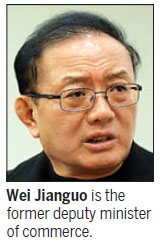China-US FTA talks suggested
Updated: 2012-03-17 07:27
By Ding Qingfen,Zhang Yuwei and Chen Weihua (China Daily)
|
||||||||
Feasibility study can be launched, but a long road remains: experts
China should propose the initiation of talks on a free trade agreement with the United States to reduce trade frictions and create benefits for both, a former senior commerce official has said.
"Why shouldn't we consider establishing an FTA between the world's two largest economies?" asked Wei Jianguo, former deputy minister of commerce.
|
 |
"We could study the feasibility of the matter," Wei said, adding that China and the US have highly complementary economies.
China should also "accelerate its steps" on establishing an FTA with Japan and South Korea, Wei said, which would connect the three top economies in Asia.
Wei's proposals come as the US is aggressively expanding its influence in the Asia-Pacific region and expects to grow its economy and create employment by taking advantage of the fast economic growth in Asia.
The world's largest economy is advancing a trade agreement in Asia, known as the Trans-Pacific Partnership, to remove trade and investment barriers among the nations involved. Nine countries, including Australia and Vietnam, have agreed to join the pact and set a goal of reaching a final agreement by the end of this year.
China is not included.
Last year, Japan, the world's third-largest economy, also announced its desire to join the Trans-Pacific Partnership talks, but the matter is pending.
China is trying to transform from a big exporter to a great consumer, while the US pledges to double its exports in five years.
Asia, including China, is a major destination for promoting American goods.
"The China-US FTA could help the US expand exports to China, reducing trade frictions," Wei said.
US experts said an FTA between China and the US should be a good thing.
"Any approach by China to initiate discussions with the US on a free trade agreement should be welcome," said Vikram Nehru, senior associate of Southeast Asian Studies at the Carnegie Endowment for International Peace, a Washington-based think tank.
But he stressed that "China should be aware that US concerns extend well beyond trade barriers and are likely to include "behind-the-border" trade issues.
These trade issues could involve explicit budgetary subsidies and implicit policy-related subsidies to State enterprises.
Regulations that shield State enterprises from competition in domestic markets such as restrictions on government procurement and barriers that inhibit new firms from entering key manufacturing and services sectors, could also be a problem, Nehru claimed.
The protection of intellectual property rights of US companies by the Chinese legal system is also a big concern, Nehru said.
"I think the time has come for a new and bolder approach," Maurice Greenberg, former chief of AIG and now chairman and CEO of C.V. Starr and Co, said in an article in the Wall Street Journal in January.
"China and the US should open negotiations for a free trade agreement between our two countries," he said.
"The negotiations will not be easy. There will be numerous impasses, and the negotiations will probably last for many years. But discussing problems in the context of driving toward a potential agreement is far better than lengthy dialogues without an end result," Greenberg said.
"Even if we fail to reach an agreement on many issues, progress should be possible on some issues, and that will create a better trade climate. The alternative is that we drift along constantly irritating each other in a low-grade trade war that will leave businesses and consumers in both countries losers."
Many are worried about a trade war between the world's top two economies as the US recently announced the establishment of an interagency trade-enforcement unit to investigate whether nations, including China, play by trade rules.
The US House of Representatives recently passed a bill allowing the US Commerce Department to continue to charge countervailing duties worth $5 billion on imports from China.
But a China-US FTA may not be established soon.
"In the short term, talks on a China-US FTA are highly unlikely," said Zhang Yunling, director of the division of international studies under the Chinese Academy of Social Sciences.
The US is strongly committed to advancing the Trans-Pacific Partnership, setting up trade rules in Asia based on its own wishes, Zhang said.
There are many things that have to be addressed before the talks could start, including the US recognizing China's market economy status, an issue that the two nations have long been arguing over.
Contact the writer at dingqingfen@chinadaily.com.cn











